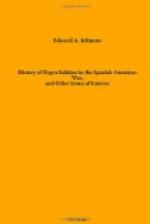The above regiments were the only colored troops that were engaged in active service in Cuba. There is no statute requiring colored artillery regiments to be organized, and there are therefore none in the regular army.
* * * * *
A LIST OF THE VOLUNTEER REGIMENTS.
Third North Carolina—All colored officers.
Sixth Virginia—White officers, finally, the colored officers resigned “under pressure,” after which there was much trouble with the men, as they claimed to have enlisted with the understanding that they were to have colored officers.
[Illustration: OFFICERS OF THE NINTH OHIO—LIEUTENANT YOUNG IN THE CENTER.]
Blank Page
Ninth Ohio—All colored officers; Col.
Chas. Young, graduate of West
Point.
Twenty-third Kansas—Colored officers.
Eighth Illinois—Under colored officers,
and did police duty at San
Luis, Cuba.
Seventh U.S. Volunteers.
Tenth U.S. Volunteers.
Eighth U.S. Volunteers.
Ninth U.S. Volunteers.
The conduct of the colored volunteers has been harshly criticised, and it is thought by some that the conduct of the volunteers has had some influence in derrogation of the good record made by the regulars around Santiago. This view, however, we think unjust, and ill-founded. There was considerable shooting of pistols and drunkenness among some regiments of volunteers, and it was not confined by any means to those of the colored race. The white volunteers were as drunk and noisy as the colored, and shot as many pistols.
The Charlotte Observer has the following editorial concerning some white troops that passed through Charlotte, N.C.:
“Mustered-out West Virginia and New York volunteer soldiers who passed through this city Saturday night, behaved on the train and here like barbarians, disgracing their uniforms, their States and themselves. They were drunk and disorderly, and their firing of pistols, destruction of property and theft of edibles was not as bad as their outrageous profanity and obscenity on the cars in the hearing of ladies. Clearly they are brutes when sober and whiskey only developed the vileness already in them.”
By a careful comparison of the reports in the newspapers, we see a slight excess of rowdyism on the part of the whites, but much less fuss made about it. In traveling from place to place if a white volunteer company fired a few shots in the air, robbed a fruit stand, or fussed with the by standers at railroad stations or drank whiskey at the car windows, the fact was simply mentioned in the morning papers, but if a Negro company fired a pistol a telegram was sent ahead to have mobs in readiness to “do up the niggers” at the next station, and at one place in Georgia the militia was called out by a telegram sent ahead, and discharged a volley into the car containing white officers and their families, so eager were they




